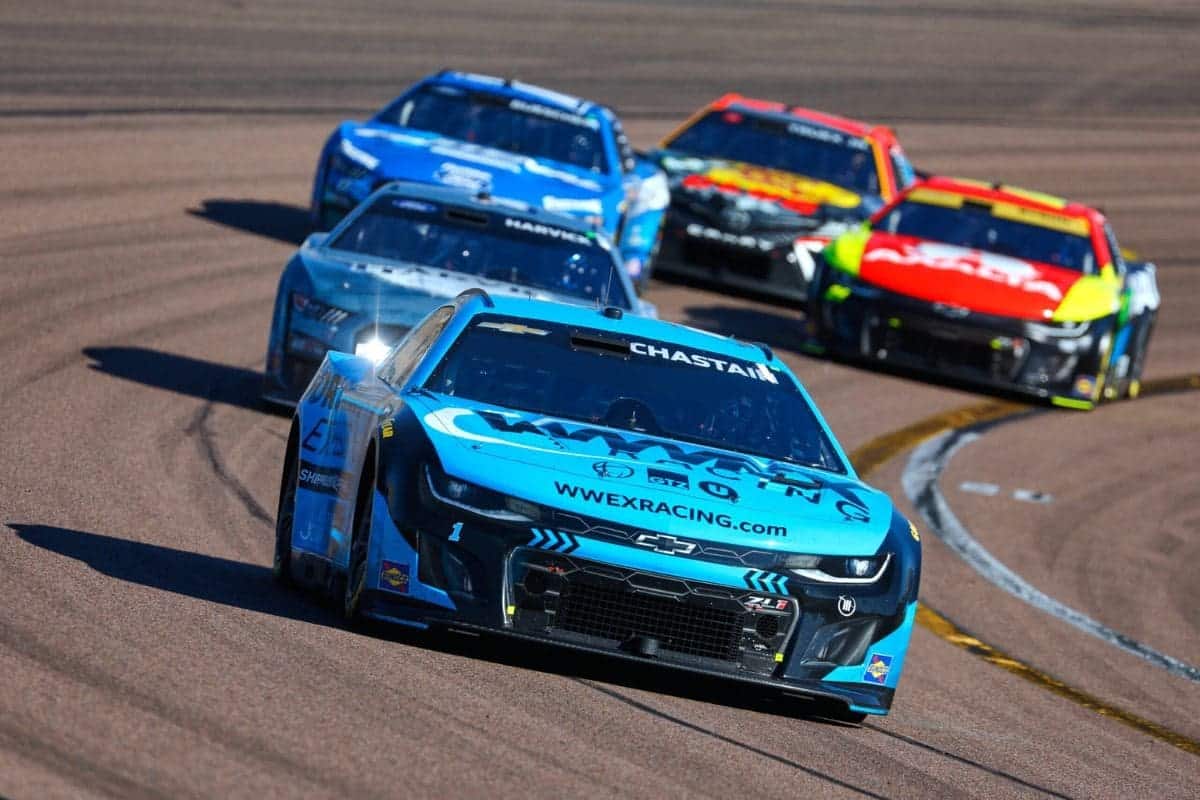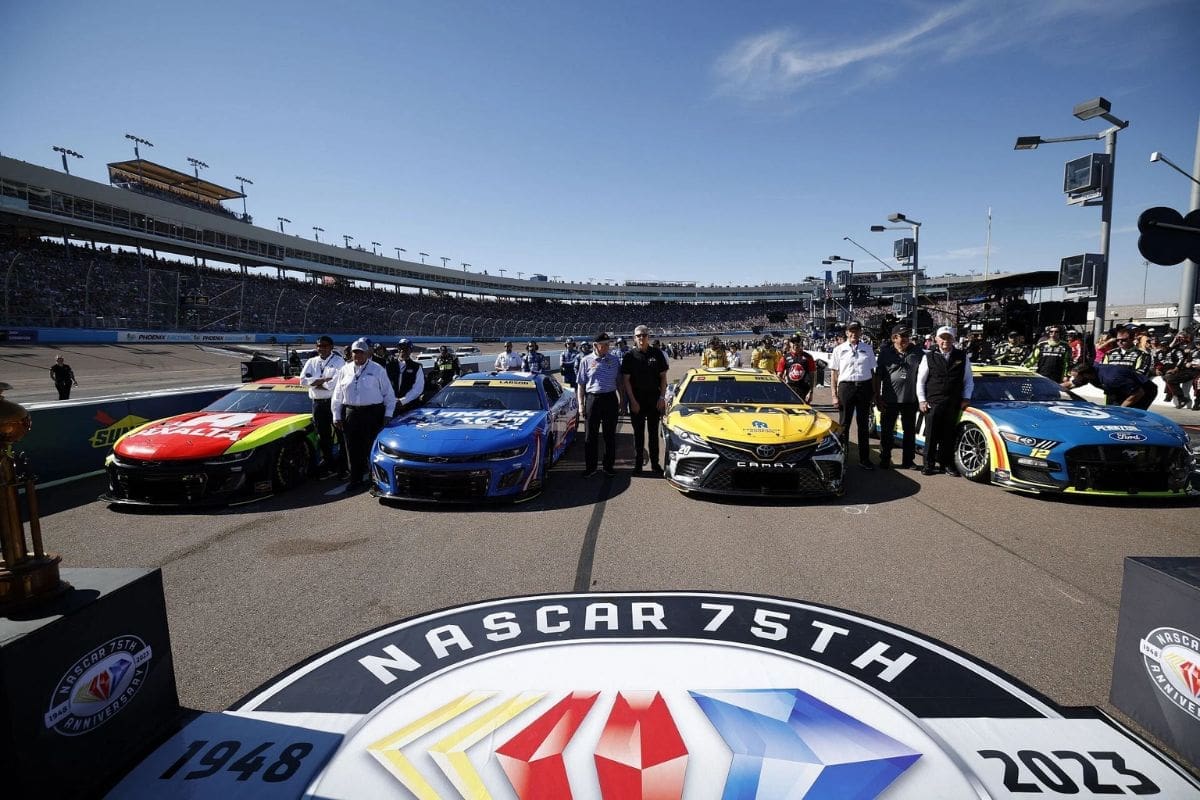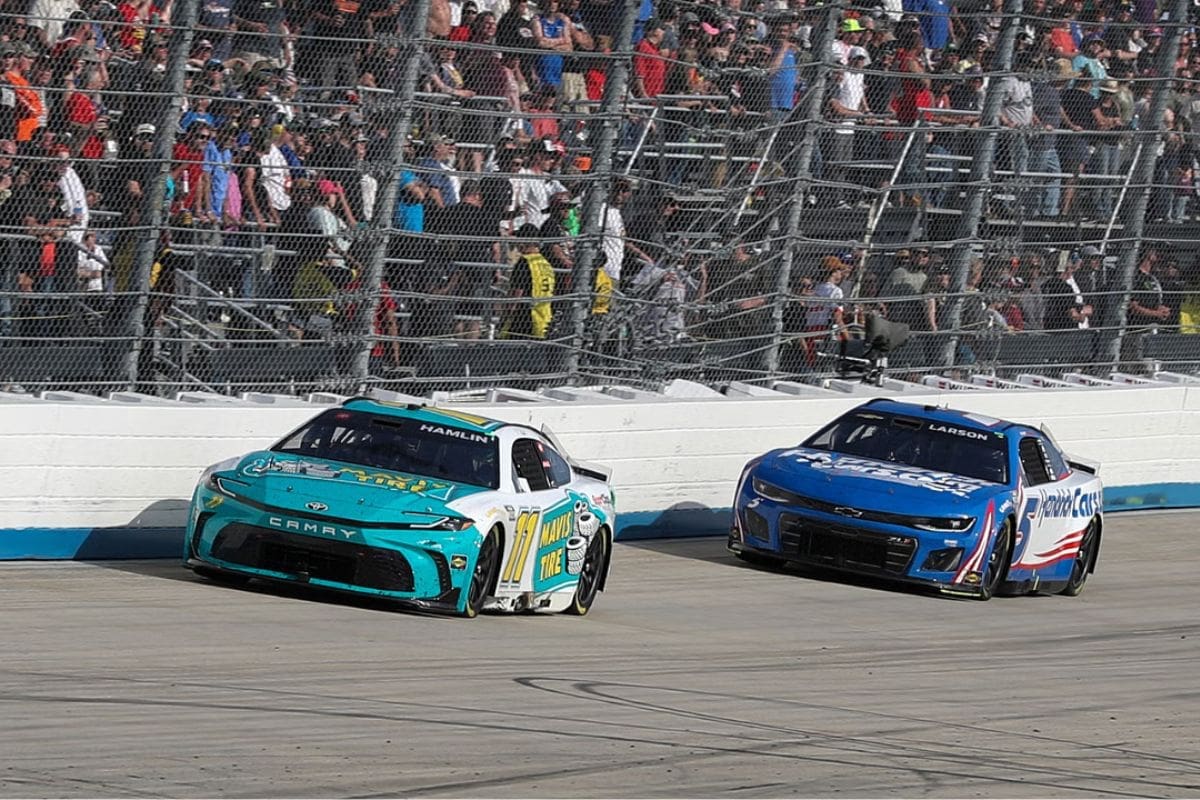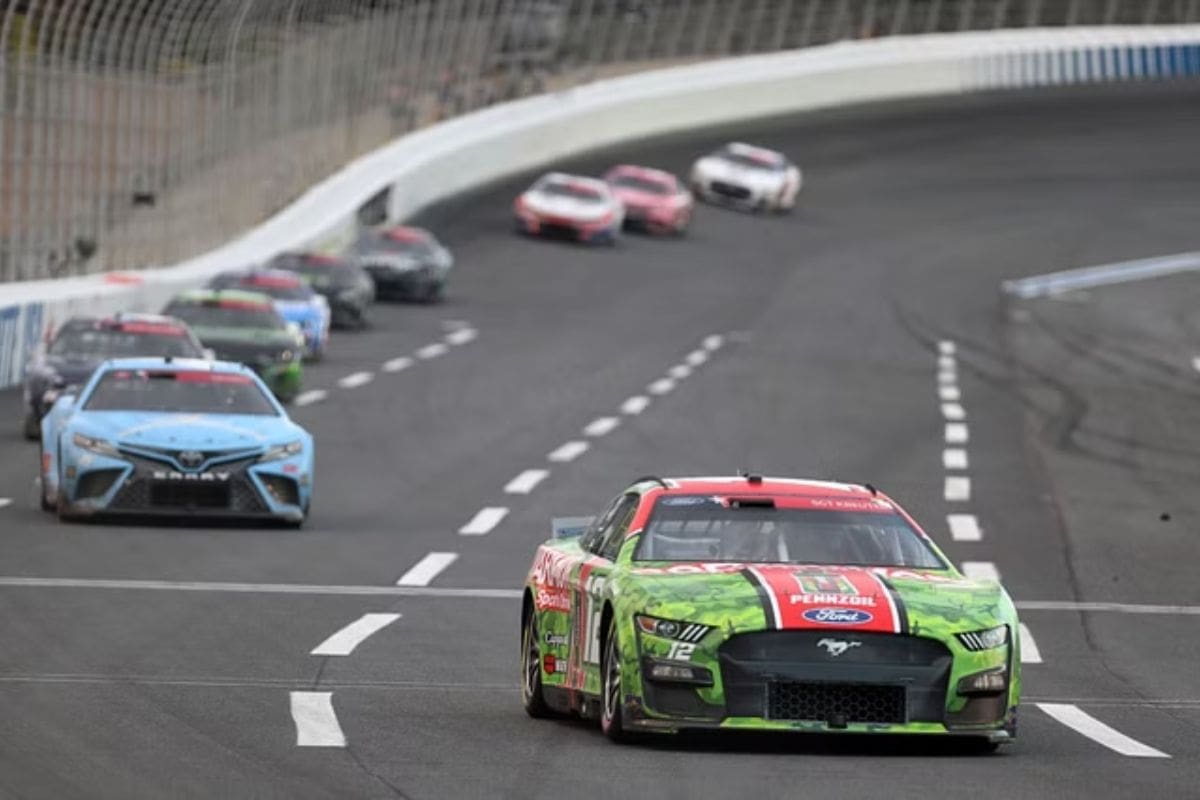NASCAR’s Proposal to Downsize HMS and JGR: NASCAR’s recent proposal to cap the charter ownership of leading teams like Hendrick Motorsports (HMS) and Joe Gibbs Racing (JGR) at three charters each has sparked considerable debate within the motorsport community. This potential downsizing raises critical questions about the competitive landscape, financial stability, and operational strategies for these powerhouse teams. Fans and industry insiders are deeply concerned about how such a move might alter the sport’s integrity and marketability. As the discussions progress, the implications of this proposal are likely to be far-reaching, affecting everything from team dynamics to fan engagement. The unfolding negotiations promise to be a controversial battleground.
Key Highlights
- Proposal to limit team ownership to three charters could force powerhouse teams HMS and JGR to downsize.
- Potential exemptions for HMS and JGR spark concerns about competitive parity and fairness.
- Fan outrage centers around the potential decrease in charter valuation and impact on team operations.
- Smaller teams could benefit from reallocated charters, but financial sustainability remains uncertain.
- Changes may affect fan engagement and NASCAR’s marketability, raising concerns about the sport’s future.
Introduction to NASCAR Silly Season Drama: Charter Negotiations
Steering through the intricacies of NASCAR’s charter negotiations, this season’s developments have introduced unprecedented drama, attracting significant attention to the potential implications for major teams like Hendrick Motorsports and Joe Gibbs Racing. The ‘silly season,’ a period typically characterized by driver and team changes, has taken on a new dimension with these negotiations, reflecting the evolving landscape of the sport and its governance.
The current charter system, implemented in 2016, has provided stability and a semblance of equity among teams, granting them a guaranteed spot in races and a share of revenue. However, recent rumors swirling around Stewart Haas Racing’s potential charter sale have served as a catalyst for broader discussions on the system’s future. These discussions are particularly consequential for powerhouse teams such as HMS and JGR, which hold multiple charters and wield significant influence within the sport.
Central to the drama is the speculation over a game-changing provision that could reshape the competitive balance. While the specifics of the provision remain under wraps, it is widely believed to involve adjustments that could impact the number of charters any single team can hold. This has naturally caused waves across the NASCAR community, with stakeholders keenly aware that such changes could alter the dynamics of team operations, sponsorship agreements, and long-term strategic planning.
NASCAR’s Proposal for Charter Ownership Limit
Amid the ongoing charter negotiations, NASCAR’s proposal to limit team ownership to three charters has emerged as a crucial point, potentially reshaping the competitive dynamics for dominant teams like Hendrick Motorsports (HMS) and Joe Gibbs Racing (JGR). This proposal, reported by Jordan Bianchi, highlights an attempt by NASCAR to democratize the grid and prevent monopolization by a few powerhouse teams. However, this shift is not without its complexities and potential repercussions.
The new rule would limit teams to operating only three charters. This is disappointing for strong teams like JGR and HMS. Besides these teams, only Stewart Haas Racing currently runs four cars, but their future is uncertain. If this rule takes effect, not only will SHR’s 4 charters be available, but also 2 more, by 2025.
The proposed cap is part of broader negotiations complicated by underlying tensions over revenue distribution. Powerhouse teams argue that their investments and contributions justify a larger share of the financial pie, while NASCAR’s stance suggests a move towards a more egalitarian distribution model. This tug-of-war is indicative of the sport’s evolving economic landscape.
Exemptions and Fan Reactions
The recent report suggesting potential exemptions for Hendrick Motorsports (HMS) and Joe Gibbs Racing (JGR) from NASCAR’s proposed charter ownership limit has triggered a wave of mixed reactions among the fanbase. Concerns are mounting over the implications such exceptions might have on competitive parity within the sport. The very essence of a cap is to provide a level playing field; however, if top-tier teams like HMS and JGR are exempt, the objective might be undermined, raising questions about the integrity and rationale behind the proposal.
“first it was car parity, now they want team parity.” – (fan reaction)
Why cap it to 3 then if it doesnt even apply to everyone?” – (fan reaction)
Parity Concerns: Many fans believe that exempting HMS and JGR could exacerbate existing disparities, making it harder for smaller teams to compete effectively.
Strategic Motives: Speculations abound regarding the potential ulterior agendas behind the exemptions. Some suggest it is a tactical ploy by rival teams to curb the dominance of heavyweights like HMS, JGR, and Stewart-Haas Racing (SHR).
“This is definitely the Spire, Trackhouse, 23XI, Roush, RCR, FRM group trying to break up the Gibbs, SHR, Hendrick brigades.” – (fan reaction)
Fan Disillusionment: There’s a noticeable sense of disillusionment among fans who feel that such exemptions would only perpetuate the status quo, undermining efforts to democratize the sport.
Credibility Issues: Questions are being raised about NASCAR’s long-term credibility and commitment to fairness if exceptions are granted selectively.

Impact on Charter Valuation and Future Scenarios
The proposal to impose a cap on the number of charters that powerhouse teams like Hendrick Motorsports (HMS) and Joe Gibbs Racing (JGR) can control is expected to impact their market value significantly. If these leading teams are compelled to divest charters, an oversupply in the market could lead to a decrease in charter prices. This could devalue the investments of existing charter owners, who have historically held these assets as valuable equity. Charter values are no longer around $40 million as they were last year. Currently, there are rumors of four SHR charters being on the market. If two more are added, the value of charters will drop even more.
“If Hendrick and Gibbs are forced to sell a charter it guarantees that said charter will go for well below market rate. That would just be bad all around.” – (fan reaction)
The potential decrease in charter valuation raises concerns about the financial stability and attractiveness of NASCAR as an investment opportunity. Teams may need to reassess their financial strategies, including sponsorship deals and budget allocations, to adapt to the new economic landscape. Moreover, the reallocation of charters to smaller or emerging teams could democratize the competition but also introduce operational inefficiencies if these teams lack the expertise and resources of their larger counterparts.
From a competitive standpoint, the redistribution of charters might foster a more level playing field, ostensibly reducing the dominance of top-tier teams. However, fans and analysts predict minimal changes in the competitive hierarchy due to potential loopholes and strategies these powerhouse teams might employ to maintain their competitive edge. They could engage in strategic alliances or form subsidiary teams to circumvent the proposed limitations.
Uncertainty and Potential Tweaks
Given the complexities surrounding the proposal’s potential impact on charter valuation and competitive dynamics, the uncertainty and potential tweaks to the charter cap are drawing intense scrutiny from stakeholders across NASCAR. The speculative nature of the proposal has not only stirred resistance among teams but has also left fans and analysts anticipating the next steps with bated breath.
“I am sure there will be shenanigans as a loophole – Penske already has the Wood Brothers. One of Gibbs’ will transfer to 23XI, Hendrick will have Trackhouse or JRM – so really nothing will change.” – (fan reaction)
- Charter Valuation: Teams are wary of how downsizing might depreciate the value of their charters, fundamentally altering the financial landscape.
- Competitive Balance: Adjusting the number of charters per team could disrupt the existing competitive equilibrium, potentially favoring certain teams over others.
- Operational Viability: There are fears that smaller teams might struggle to sustain operations if the economic model underpinning charters is destabilized.
- Fan Engagement: Uncertainty about team compositions and grid sizes might affect fan loyalty and engagement, with broader implications for NASCAR’s marketability.
The steadfast resistance from teams like Hendrick Motorsports (HMS) and Joe Gibbs Racing (JGR) is a clear signal that negotiations will be crucial. These discussions will likely re-evaluate the proposal’s assumptions and consider alternative solutions that balance financial sustainability with competitive integrity.
One potential tweak under consideration is a phased implementation, allowing teams to gradually adjust to the new structure. Another possibility is creating exceptions or additional compensatory mechanisms for teams adversely affected by the downsizing.
News in Brief: NASCAR’s Proposal to Downsize HMS and JGR
The proposal to limit charter ownership for powerhouse teams such as Hendrick Motorsports and Joe Gibbs Racing has incited substantial controversy within the NASCAR community.
The potential reduction of charters from four to three raises critical concerns regarding competitive balance, financial stability, and operational viability.
This controversial issue highlights the complexity of maintaining the sport’s integrity while adapting to evolving market dynamics, emphasizing the necessity for careful consideration and potential adjustments to proposed regulations.
Our Reader’s Queries
Q. Who is the owner of Joe Gibbs Racing?
A. Joe Gibbs Racing (JGR), an American professional stock car racing organization, was founded by Pro Football Hall of Fame coach Joe Gibbs.
Q. Does Joe Gibbs Racing still exist?
A. Joe Gibbs Racing (JGR) stands as one of NASCAR’s premier organizations, boasting four NASCAR Cup Series teams, three NASCAR Xfinity Series teams, an ARCA Series team, and a robust driver development program.
Q. Who will drive for Joe Gibbs in 2024?
A. In 2024, Joe Gibbs Racing will field four full-time entries in the NASCAR Xfinity Series. The team will feature Sheldon Creed and Chandler Smith as full-time drivers, reinforcing JGR’s strong presence in the series.
ALSO READ: Hendrick Motorsports’ Eyes Dover Glory: Recreating Historic 2021 Win



